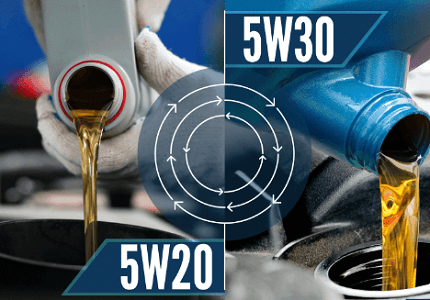Yes, you can mix 5W20 and 5W30 motor oil together. Combining 5W20 and 5W30 motor oil is permissible and will not cause any harm to your engine.
Both oils have similar viscosity ratings, with the main difference being the temperature range they are designed to operate in. 5W30 oil is better suited5W30 oilr temperatures, 5W30 oil is better suited for warmer climates. Mixing these oils will result in a viscosity that falls between 5W20 and 5W30, providing adequate engine protection in a wider range of temperatures.
However, it is important to note that mixing oils may affect the specific performance characteristics of each oil, so it is generally recommended to stick with the oil viscosity specified by your vehicle’s manufacturer for optimal engine performance and longevity.
Understanding Engine Oil Grades
Understanding Engine Oil Grades:
Engine oil grades, such as 5W20 and 5W30, are standardized codes that indicate the oil’s viscosity characteristics. The numbers before the “W” represent the oil’s viscosity rating at lower temperatures, while the numbers after the “W” represent the viscosity rating at higher temperatures.
What do the numbers in 5W20 and 5W30 mean?
The number before the “W” represents the oil’s winter viscosity rating. In this case, both 5W20 and 5W30 oils have a winter viscosity rating of 5, meaning they flow easily at low temperatures, even during cold starts.

The numbers after the “W” indicate the oil’s viscosity rating at higher temperatures, with 20 and 30 representing different levels of viscosity. Lower numbers correspond to lighter, less viscous oils, while higher numbers indicate thicker, more viscous oils.
Differences between 5W20 and 5W30 oils:
| Differences | 5W20 Oil | 5W30 Oil |
|---|---|---|
| Viscosity | Thinner | Thicker |
| Temperature Range | Best for colder climates | Better for warmer climates |
| Fuel Efficiency | Potentially higher | Slightly lower |
| Engine Protection | May provide sufficient protection | Offers better protection, especially in high-temperature conditions |
Importance of choosing the right oil grade for your engine:
Choosing the correct oil grade for your engine is crucial as it directly affects the engine’s performance and protection. Using the recommended oil grade, as specified by the manufacturer, ensures optimal lubrication, as well as protection against wear and tear. It prevents potential damage due to inadequate oil flow at lower temperatures or excessive thinning or thickening of the oil at higher temperatures. Ultimately, choosing the right oil grade promotes a healthier engine and prolongs its lifespan.
Can I Mix 5w20 And 5w30?
When it comes to mixing engine oils, such as 5W20 and 5W30, it is important to consider the potential risks and consequences. It is generally not recommended to mix different oil grades, as they are formulated with specific viscosity and additives that perform optimally within a certain range of temperatures.
Mixing oils with different viscosities can compromise the performance of the engine and lead to increased wear and tear. The additives in different oil grades may also react differently when mixed, causing potential engine damage.
Therefore, it is always best to follow the manufacturer’s recommendation for your specific vehicle and use the oil grade specified. Taking into account the potential risks involved, it is generally advised to avoid mixing different oil grades.
Effects Of Mixing 5w20 And 5w30 On Engine Performance
Mixing 5W20 and 5W30 oils may have certain impacts on your engine’s performance. One important aspect to consider is the impact on lubrication and engine wear. These two oils have different viscosity levels, with 5W20 being thinner than 5W30. Mixing them can result in a blend that offers inadequate lubrication, potentially leading to increased engine wear over time.
Another factor to consider is the effects on fuel efficiency and oil consumption. The different viscosity of these oils can impact fuel economy as well as oil consumption. Mixed oils can cause the engine to work harder, resulting in lower fuel efficiency and potentially increased oil usage.
It is also crucial to assess the compatibility with engine components and seals. The formulation of 5W20 and 5W30 varies, and mixing them might not be compatible with certain engine components and seals. This incompatibility could lead to leaks or damage to engine parts, affecting overall performance.
| Effect | Impact |
|---|---|
| Lubrication and engine wear | Inadequate lubrication and potential increase in engine wear |
| Fuel efficiency and oil consumption | Possible lower fuel efficiency and increased oil usage |
| Compatibility with engine components and seals | Potential leaks or damage to engine parts |

Credit: www.amazon.com
When Is Mixing 5w20 And 5w30 Recommended?
There are certain scenarios and conditions where mixing oil grades is advisable. Firstly, if you find yourself in a situation where the correct oil for your vehicle is not available, you can mix 5W20 and 5W30 as a suitable temporary solution.
Additionally, mixing these two oils can help fine-tune viscosity for engines that require a slightly different grade. It can also be beneficial in extreme weather conditions, as the combination of the two oils offers enhanced protection.
However, it is important to consider the potential drawbacks of mixing oils. Mixing different oils may affect the overall performance and efficiency of your engine and could lead to reduced oil life.
Expert opinions on when to mix 5W20 and 5W30 vary. While some experts suggest that mixing these two oils is generally not recommended, others believe that it can be done safely and effectively in certain circumstances. It is always advisable to consult with a professional mechanic or refer to your vehicle manufacturer’s recommendations before deciding to mix oils.
Proper Procedures For Mixing 5w20 And 5w30
Proper Procedures for Mixing 5W20 and 5W30:
When it comes to mixing 5W20 and 5W30 engine oils, it is important to follow the recommended proportions and techniques. Mixing different grades of oil without proper knowledge and precautions can have negative effects on your engine’s performance and longevity.
Steps to safely and effectively mix engine oils:
- First, ensure that both the 5W20 and 5W30 oils meet the required specifications for your vehicle.
- Start by measuring the amount of each type of oil you will be using. Recommended proportions for mixing may vary depending on your specific engine and vehicle manufacturer’s guidelines.
- Add the oils together in a clean and suitable container, such as an oil mixing jug or a clean and empty oil bottle.
- Thoroughly mix the oils by gently shaking or stirring the container. Ensure that the oils are well blended before using the mixture.
- Once the oils are mixed, use the appropriate tools, such as a funnel, to pour the blended oil into your vehicle’s engine.
- Dispose of any remaining or unused oil properly, following the local regulations for oil disposal.
Recommended proportions and techniques for mixing different grades:
The recommended proportions for mixing 5W20 and 5W30 oils may vary depending on the manufacturer and type of vehicle. It is crucial to consult your vehicle’s owner’s manual or contact a qualified professional for specific guidelines. However, a commonly suggested ratio is to mix an equal amount of both oils, combining them in a 1:1 ratio.
Tools and equipment needed for proper oil mixing:
- Clean and suitable container (oil mixing jug or clean and empty oil bottle)
- Funnel
Alternative Solutions To Mixing 5w20 And 5w30
Mixing 5W20 and 5W30 engine oils can have adverse effects on your vehicle’s performance. However, there are alternative options to consider for optimizing your engine’s performance.
Using oil additives and supplements: One option is to use oil additives and supplements that are designed to improve oil viscosity and performance. These products can help compensate for the effects of mixing different viscosities and ensure proper lubrication for your engine.
Considering oil change intervals and maintenance practices: Another approach is to closely monitor your oil change intervals and follow regular maintenance practices. oil viscositiesa consistent oil change schedule and adhering to manufacturer-recommended oil specifications, you can reduce the chances of mixing different oil viscosities.
Remember, it is always best to consult your vehicle’s manufacturer or a professional mechanic for guidance on the specific requirements and recommendations for your engine.

Conclusion
To sum up, while it is generally not recommended to mix 5W20 and 5W30 oils, some experts suggest that in emergency situations, a small amount for a short period may be acceptable. Nevertheless, it is always best to consult your vehicle’s owner manual or a professional mechanic for specific recommendations.
Taking the right steps when it comes to oil selection will ensure the longevity and performance of your engine.


Leave a Reply